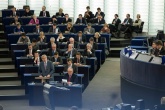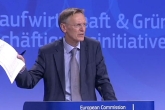EC launches public consultation on Circular Economy Package
The European Commission (EC) has today (28 May) opened a public consultation to collect views on the main policy options for developing an ‘ambitious’ new approach on the circular economy, which will feed into the revised Circular Economy Package action plan, scheduled for release ‘by the end of 2015’.

It is hoped that moving towards a more circular economy will ‘promote competitiveness and innovation by stimulating new business models and technologies’ as well as facilitating social innovation and protecting natural resources and the environment.
According to the EC, the previous approach had a ‘rather exclusive focus on waste management, without appropriately exploring synergies with other policies’, such as ‘product policies or the development of well-functioning markets for secondary raw materials’. As such, the consultation builds on the ‘indicative roadmap’ and seeks views on the importance of taking action on product lifecycle, ecodesign, reuse and repair, recycling, sustainable consumption, waste policy, recycling levels, and creating stronger markets for secondary raw materials and specific sectorial measures.
The upcoming package will eventually comprise a revised legislative proposal on waste and a communication setting out an action plan on the circular economy.
Responses from the EC’s stakeholder conference on the circular economy (being held in Brussels on 25 June) will also feed into the consultation process.
The collated responses will then be used to inform the new Circular Economy Package proposals, which are being prepared by a project team led by First Vice-President Frans Timmermans, Vice-President Jyrki Katainen, Environment Commissioner Karmenu Vella, and Industry Commissioner Elżbieta Bieńkowska.
Consultation details
The consultation is open to ‘citizens, public authorities, businesses and all other interested governmental and non-governmental parties’ and covers five areas:
- production;
- consumption;
- markets for secondary raw materials;
- sectoral measures; and
- ‘enabling factors for the circular economy’, including innovation and investment.
It asks respondents to outline the level of importance of a range of policies that the EC could take to bring about the circular economy.
For example, the consultation asks respondents to assess the importance of a range of potential EC actions, including:
- establishing binding rules on product design (e.g. minimum requirements on ‘durability’ under the Ecodesign Directive 2009/125/EC);
- promoting and/or enabling the use of economic incentives for eco-innovation and sustainable product design (e.g. via rules on extended producer responsibility schemes);
- encouraging reparability through the availability of spare parts;
- increasing content of reused parts or recycled materials;
- ensuring availability of reliable data on material flows across value chains;
- addressing perceived regulatory gaps or obstacles in EU legislation;
- establishing a legally-binding framework at EU level (e.g. sustainability criteria);
- promoting the development of repair and maintenance services;
- providing more information relevant to the circular economy to consumers, for example on expected lifetime of products or availability of spare parts;
- financing innovative projects or technologies relevant to the circular economy (from EU funds, e.g. Horizon 2020); and
- supporting market penetration of innovative projects through labelling, certification and standards, public procurement for innovation, et cetera.
Obstacles to the development of recyclate markets
Although the consultation does not touch on whether there will be new EU-wide recycling targets, or country-specific targets (as previously hinted at), it asks for the public to identify the ‘main obstacles to the development of markets for secondary raw materials in the EU’.
The list includes:
- poor quality of recycled materials (e.g. containing unwanted substances/high contamination);
- lack of information or misinformation about the quality of recycled materials;
- poor availability of waste/material to be recycled;
- poor reliability of supply for recycled materials;
- low demand for recycled materials (e.g. on the EU market);
- cost differential between primary and secondary raw materials;
- organisational cost of switching from primary to secondary raw materials in industrial processes;
- regulatory gaps and obstacles at national/regional/local level;
- regulatory gaps and obstacles at EU level;
- insufficient cooperation/exchange of information along the value chain (e.g. between producers, recyclers and authorities responsible for waste management); and
- lack of reliable data on secondary raw material flows.
The consultation document reads: ‘This initiative aims at promoting the transition to the circular economy through a comprehensive, coherent approach that fully reflects interactions and interdependence along the whole value chain, rather than focusing exclusively on one part of the economic cycle. It will comprise a revised legislative proposal on waste and a Communication setting out an action plan on the circular economy for the rest of this Commission’s term of office. The action plan will cover the whole value chain, and focus on concrete measures with clear EU added value, aiming at ‘closing the loop’ of the circular economy. The circular economy initiative will also contribute to wider EU objectives such as the Energy Union, the climate objectives and resource efficiency.
‘Input from stakeholders and the public will be a key factor in the preparation of this work. The objective of this public consultation is to help the Commission to pinpoint and define the main barriers to the development of a more circular economy and to gather views regarding which measures could be taken at EU level to overcome such barriers.’
‘There is no alternative to using our resources more intelligently’
Launching the consultation this morning, Timmermans said: “Europe’s future economic development must be part of a sustainable development. There is no alternative to using our resources more intelligently, designing our products with a view to their reuse and recycling, and setting ambitious targets for waste reduction and recycling. Today we are asking people across Europe for their input on how to design our policies in a way that stimulates a competitive green economy in Europe and protects the environment for future generations.”
Vice-President Jyrki Katainen added: “Moving towards a more sustainable circular economy can create win-win solutions and provide Europe with a new competitive advantage. We want to put forward a comprehensive action plan with incentives for both consumers and businesses to use resources more efficiently. For this we need input from stakeholders in all parts of the value chains.”
The Environmental Services Association (ESA) has already commented on the consultation, with ESA’s Europe Policy Advisor, Roy Hathaway, saying: “What the European Commission has published today is an open-ended questionnaire which seeks views from interested parties across Europe on what should be included in its revised Circular Economy Package, to be tabled by the end of the year.
"The questionnaire certainly covers the key elements likely to feature in that package – production, consumption, the markets for secondary raw materials, key industry sectors, and circular economy enablers such as innovation and investment - but it gives very little indication of what measures the commission itself is likely to favour.
"Nevertheless the consultation provides an important opportunity for the waste and resource management sector to press for the measures it needs to invest in a more circular European economy, in particular a stable long term policy framework and sustainable markets for secondary raw materials.”
The consultation will run until 20 August 2015.
Respond to the Circular Economy Package consultation.











